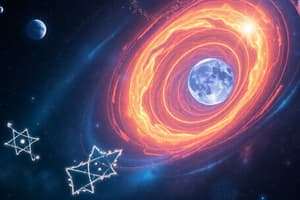Podcast
Questions and Answers
What did Galileo discover about falling objects?
What did Galileo discover about falling objects?
- Light objects float in the air
- Only heavy objects fall towards the ground
- Things fall at different speeds depending on their weight
- Everything falls towards the ground at the same speed (correct)
The Earth was once believed to be the center of the universe.
The Earth was once believed to be the center of the universe.
True (A)
What is the Universal Law of Gravitation?
What is the Universal Law of Gravitation?
Everything in the universe pulls on everything else, and the force of gravity gets weaker as things get farther apart.
What are Kepler's three laws of planetary motion about?
What are Kepler's three laws of planetary motion about?
The force of gravity depends on the _______ of the objects and how far apart they are.
The force of gravity depends on the _______ of the objects and how far apart they are.
What did Cavendish measure to understand gravity?
What did Cavendish measure to understand gravity?
What happens to the force of gravity as one moves further from Earth's surface?
What happens to the force of gravity as one moves further from Earth's surface?
Gravity is a force that pulls objects towards each other.
Gravity is a force that pulls objects towards each other.
What is potential energy in the context of gravity?
What is potential energy in the context of gravity?
Flashcards are hidden until you start studying
Study Notes
Gravity and the Universe
- Galileo Galilei discovered that everything falls at the same speed regardless of mass.
- Copernicus proposed that the Sun is the center of the universe and planets revolve around it.
- Kepler's three laws describe planetary motion:
- Planets move in elliptical orbits around the Sun.
- Planets move faster when closer to the Sun and slower when further away.
- The orbital period of a planet is related to its distance from the Sun.
- Newton's Law of Universal Gravitation states that every object in the universe attracts every other object.
- The force of gravity weakens as objects move further apart.
Gravity and Masses
- Gravity is the force of attraction between objects with mass.
- The greater the mass of the objects, the stronger the gravitational pull.
- The force of gravity between two objects cancels out when they are equidistant but on opposite sides of a third object.
- If a small mass is inside a hollow ball, the gravitational force is zero as forces from all parts of the ball cancel out.
- The force on a mass outside a hollow ball is as if all the ball's mass is concentrated at its center.
- Cavendish measured the strength of gravity between two objects with a special tool.
Gravity and Energy
- Gravity pulls objects towards each other.
- Gravitional force depends on the masses of the objects and the distance between them.
- Potential energy changes when an object moves against gravity.
- The change in potential energy is equal to the work done by gravitational force.
- The gravitational force on an object near the Earth's surface is constant and directed towards the Earth's center.
- An object's potential energy at a height "h" above the Earth's surface is proportional to its mass and the height.
- Gravitational potential energy can be converted into kinetic energy (energy of motion).
Studying That Suits You
Use AI to generate personalized quizzes and flashcards to suit your learning preferences.




